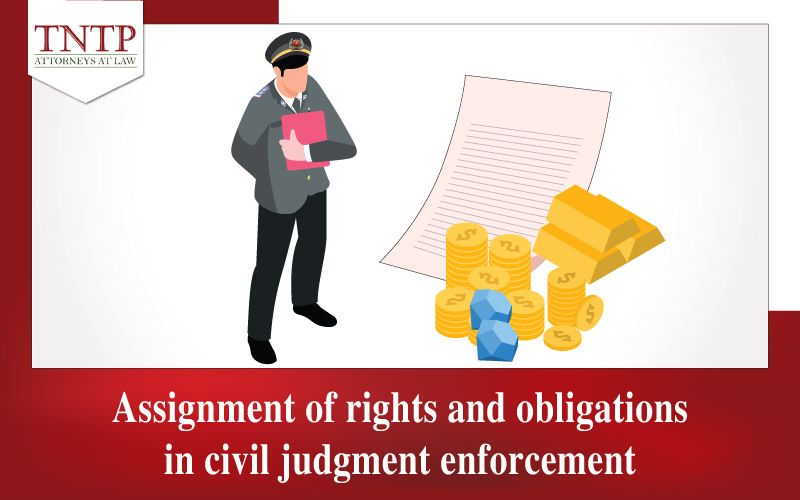Assignment of rights and obligations in civil judgment enforcement

Civil judgment enforcement is the stage aimed at ensuring that legally effective court judgments and decisions are implemented in practice. However, in reality, the parties involved in a judgment enforcement case may change for various reasons such as death, assignment, division, merger, or corporate restructuring. In such cases, the assignment of rights and obligations in judgment enforcement plays an important role. Through this article, TNTP would like to present to our readers an analysis of the assignment of rights and obligations in civil judgment enforcement.
1.What is the assignment of rights and obligations in civil judgment enforcement?
- The assignment of rights and obligations in civil judgment enforcement refers to the transfer of rights and obligations from one individual or organization (the original judgment creditor or judgment debtor) to another entity, which will then continue to fulfill those rights or obligations as prescribed in a legally effective judgment or decision. This assignment may arise from circumstances including: inheritance, corporate restructuring (including division, separation, merger, consolidation, or dissolution), transfer of obligations or rights to request enforcement, or from civil agreements.
- The assignment of rights and obligations in judgment enforcement does not alter the nature of the obligation itself; it only changes the subject who is entitled to exercise the right or required to perform the obligation during the enforcement process.
2.Cases of assignment of rights and obligations in civil judgment enforcement
The assignment of rights and obligations in civil judgment enforcement is governed by Article 54 of the Law on Civil Judgment Enforcement 2008 (as amended in 2014), as well as relevant provisions of the Civil Code and the Law on Enterprises. Accordingly, the main scenarios in which such assignments may occur include:
- Merger or consolidation: The newly formed organization is responsible for continuing to perform the rights and obligations of the original organization, unless otherwise provided by law.
- Division or separation of an organization: The decision on division or separation must clearly identify the organization or individual that will inherit the rights and obligations of civil judgment enforcement. If the decision does not specify this, the newly formed organizations shall be jointly responsible for the enforcement obligations of the original entity.
- Dissolution: The competent authority issuing the dissolution decision must notify the civil judgment enforcement agency in advance. If the enforcement rights and obligations of the dissolved organization are transferred to another organization, the successor organization shall continue to perform those rights and obligations. In cases where assets no longer exist due to an unlawful dissolution, the authority responsible for the dissolution shall be held liable to the extent of the lost assets.
The civil judgment enforcement agency, the judgment creditor, and any related parties have the right to request the competent authority to review the dissolution decision in accordance with the law.
- Bankruptcy: The enforcement rights and obligations are handled in accordance with bankruptcy laws. This includes determining interest on debts, settling secured debts, and identifying the order of asset distribution.
- Transformation of enterprise type: The newly converted company remains responsible for the outstanding debts and enforcement obligations of the pre-conversion company.
- Death of an individual: The enforcement rights and obligations are transferred to the legal heirs in accordance with the inheritance provisions of the Civil Code. Accordingly, the heir or estate administrator shall be responsible for fulfilling the deceased’s enforcement obligations.
- Aggrement to transfer the enforcement rights or obligations to a third party: The third party becomes the subject of those rights and obligations, and the agreement must be made in writing. Pursuant to Clause 2, Article 15 of Decree No. 62/2015/ND-CP, such agreement must be made in writing. However, if the judgment creditor assigns their right, consent from the judgment debtor is not required unless otherwise stipulated by law. In contrast, if the judgment debtor wishes to assign their obligation to a third party, the consent of the judgment creditor is mandatory.
3.Legal consequences of the assignment of rights and obligations in judgment enforcement
- Individuals or organizations receiving the assigned rights and obligations shall become the judgment creditor, or the judgment. The transferee of the enforcement rights and obligations has the right to file a request for judgment enforcement..
- After receiving a complete set of documents and verifying the legality of the assignment, the civil judgment enforcement agency shall issue a decision confirming the transfer of enforcement rights and obligations and proceed with the enforcement in accordance with legal regulations.
The assignment of rights and obligations in civil judgment enforcement is not only a legal mechanism to ensure that judgments are executed accurately and effectively, but also a preventive measure against the abuse of changes in legal entity or personal status to evade legal obligations. For those involved in enforcement proceedings, understanding these provisions helps protect their lawful rights and minimizes unnecessary disputes.
The above is the article “Assignment of rights and obligations in civil judgment enforcement” prepared by TNTP. We hope this article proves helpful to our valued readers.
Best regards,



